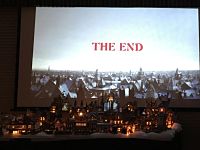
There is a weird fashion amongst conservatives to say something nice about Scrooge: he paid relatively well, he had a dry wit. Both of those are “facts” and yet nobody should want to be Scrooge . . . the early one. You can pay your workers (relatively) well and still make the workplace miserable if this is your LinkedIn profile:
Oh! But he was a tight-fisted hand at the grindstone, Scrooge! a squeezing, wrenching, grasping, scraping, clutching, covetous old sinner! Hard and sharp as flint, from which no steel had ever struck out generous fire; secret, and self-contained, and solitary as an oyster. The cold within him froze his old features, nipped his pointed nose, shriveled his cheek, stiffened his gait; made his eyes red, his thin lips blue; and spoke out shrewdly in his grating voice. A frosty rime was on his head, and on his eyebrows, and his wiry chin. He carried his own low temperature always about with him; he iced his office in the dog-days; and didn’t thaw it one degree at Christmas.
Scrooge has a “successful” business in the sense that he makes money, but he is unhappy. He sits by himself with his gruel, because he lacks real friends. All he has are workers and business partners. All his friends have been alienated over time by his behavior, including the woman he should have married. Frank Capra picks up this theme in It’s a Wonderful Life and argues that no man is a failure who has friends. Scrooge has money and power, but no friends. Scrooge forgets the reason a man wants to be a success: to flourish as a soul.
Scrooge confuses public taxation with charity. The government takes his money and so he sees no reason to give. What Scrooge misses is that government “welfare” will always be soul destroying: poor houses, debtor prisons, treadmills. The rich and powerful will find ways to profit from government contracts for “charity,” while the poor are abused. Whatever good government does will do little good for those paying the taxes, who have no choice in the matter. Scrooge feels relieved of his duty to give, but he has actually given nothing.
People need love and government cannot love you . . . only people can. Scrooge needs to give himself . . . personally.
Scrooge doesn’t see love or relationships as having anything to do with business. Bob Cratchitt is thankful for his job, but Scrooge manages this loyal worker through fear. Needless to say, threatening him with loss of his situation before Christmas is cranky at best, wicked at the worst. Scrooge measures all decisions by gain and loss for his business, making the humans work for the business instead of business for the humans. This is a perfect definition of one type of a morally wicked leader.
Scrooges thinks of “peoples” instead of individuals. The educated Mr Scrooge can speak of “surplus population” but is moved to pity for tiny Tim. Great evils can be done when smart people think in terms of classes instead of individuals (fetuses instead of this baby, those Muslims instead of my friend Mustafa). More commonly, managers or administrators can think of “workers” instead of “our clerk Bob” and so dehumanize him and, of course, a worker can do the same when he complains about the “bosses” without thinking of Mr. Scrooge as a human.
Bob never makes that mistake and so is fundamentally happy and decent. Scrooge is neither.
Scrooge builds a financial empire, but forgets why he is doing so. Scrooge fears the world and money is a protection against poverty, but he ends up living as a poor man to get money. He lacks the basic security that comes with a community. He is unhappy and has forgotten what it is to be happy, so does not miss it. He is building a kingdom, but has no heir. His business will die with him, because nobody loves what he has built. Nephew Fred, who may inherit, will never be as Scrooge has been. Whatever he has done will enrich someone who wants nothing to do with his values.
Scrooge will have made himself miserable to avoid being made miserable by poverty. Since he is morally responsible for his misery and for the misery he has inflicted on others, he is the most miserable of men.
Time to repent and do as Scrooge does at the end of A Christmas Carol: go to Church.











